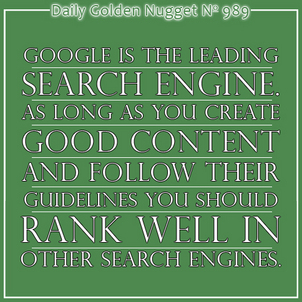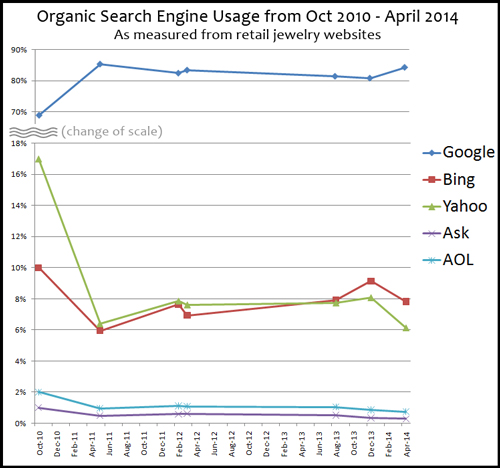
In yesterday's Daily Golden Nugget, I reviewed the most recent data for the device usage and browser usage with regard to jewelry websites. Today, I'm looking at the organic traffic that brings those users to a retail jeweler's website.
Google is the undisputed champion for search. They provide more than 84% of the organic search traffic referred to jewelry websites. I wanted to graph the change over time, but the chart was unreadable for the other search engines. As you see below, I had to adjust the scale on the chart to make it readable.

Here's the data that goes along with that chart. You'll notice that I started reporting 2 significant digits after the decimal place in May 2011. I changed my tracking methods during that time to more accurately reflect what was happening.
| Search Engine | April 2014 | Dec 2013 | Aug 2013 | Mar 2012 | Feb 2012 | May 2011 | Oct 2010 |
| 84.34% | 80.88% | 81.48% | 83.46% | 82.49% | 85.39% | 69% | |
| Bing | 7.82% | 9.15% | 7.91% | 6.92% | 7.63% | 5.94% | 10% |
| Yahoo | 6.14% | 8.09% | 7.75% | 7.62% | 7.87% | 6.41% | 17% |
| Ask | 0.29% | 0.35% | 0.51% | 0.62% | 0.58% | 0.48% | 1% |
| AOL | 0.74% | 0.85% | 1.05% | 1.10% | 1.11% | 0.95% | 2% |
The table doesn't account for 0.67% of search traffic, which came from AVG, Comcast, Babylon, Yandex, and Search.com. Those numbers are simply too small to report.
The last time I reported these organic search statistics was August 2013. You can see my analysis of them here. This time I was surprised to see the jump Bing took during the 2013 Holiday Season, but then it dropped back down to a lower level than last summer.
Every year during the holiday season all my tracking experiences a bubble of additional data as people search for their holiday gift buying needs. As you can see in yesterday's Nugget, there was a bubble of Windows OS usage in December 2013. When comparing that OS bubble to these numbers, I also found a bubble in the number of Windows users on desktop computers using the Bing search engine. There was also a bubble in the number of iPad users that chose to use Bing.
Don't let my commentary mislead you because these numbers are still very small.
Many jewelers ask me if they should worry about their ranking in any other search engine other than Google; that answer is no according to these numbers.
I should also mention that other analysis companies, like comScore.com, have reported that YouTube is the second most popular search engine after Google. Although in general this is true, you can see that's not the case for the retail jewelry industry.
The obvious reason is because very few jewelers have made their own how-to or educational videos for their YouTube channel.
Now let me spin these numbers a different way...
Another question I frequently field is if a jeweler should pay for advertising on Bing or Yahoo instead of Google AdWords. Again, based on the above numbers that answer is also no. It will take a long time to set up and manage advertising campaigns on Bing and Yahoo, but based on the traffic it's less likely that it would be time and money well spent.
When setting up Google AdWords, you need to make sure to correctly set up your ads for desktop users, mobile users, and tablet users. According to my April 2014 measurements, only 55.17% of Google searches were performed on desktops. There were 31.17% performed through smartphones, and 13.66% through tablets.
Google had changed their AdWords platform a lot since August 2013. By default they force you to show your ads on all mobile devices and tablets. Prior to the middle of 2013 you had the choice to ignore all mobile devices.
Obviously when you look at these numbers, you can see that Google would lose 45% of their AdWords revenue if they didn't force us all into displaying ads on smartphones and by default.
Now that you have it you might be wondering what to do with this search engine information.
First of all, don't worry about the other guys. Go back and review this older Nugget explaining what Google wants on your website.
Second, make sure you also pay attention to Google's Webmaster Guidelines here:
https://support.google.com/webmasters/answer/35769
Generally speaking, as long as you follow the rules Google outlines you will also rank well in other search engines.








